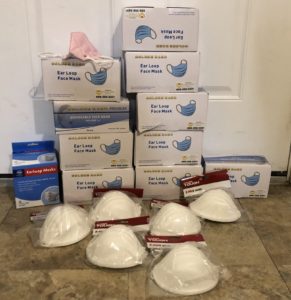COVID-19
By Rebecca Aguilar
Lucy Bocanegra was surprised to see a clerk wearing a respiratory mask when she was shopping at a Dallas upholstery supply store. He told her he was afraid he would get infected with the coronavirus. That was enough to convince Bocanegra to start buying disposable masks just in case the coronavirus spreads to Dallas. “It’s on my shopping list. So is bottled water, canned food and Pedialyte in case we have to hydrate due to fever.”

Photo courtesy of Rebecca Aguilar
But medical experts in Dallas say there is no need for people to start stockpiling face masks because of the illness, known as COVID-19. “At this point, Texas is very low risk for the coronavirus,” says Marisa Gonzalez, the public information officer with Dallas County Health and Human Services (DHHS). Currently are no reported cases of coronavirus in Texas, but the Centers for Disease Control and Prevention (CDC) has confirmed multiple cases of COVID-19 in people under federal quarantine at Lackland Air force base in San Antonio. They were moved to San Antonio from a cruise ship docked in Japan.
COVID-19 was first detected in Wuhan, China, in December 2019. According to the World Health Organization (WHO), the virus was found in a group of people who suffered from pneumonia. Most of them worked in the seafood and live animal market in Wuhan. The illness spread to family members and healthcare staff in Wuhan. The World Health Organization says the coronavirus can be transmitted from animals to humans, which is called a “spillover event.”
Saturday, the CDC confirmed the first COVID-19 death in the U.S. The victim was a 50-year-old man who was being hospitalized in the state of Washington. It’s still not known how he was infected.
“This is a respiratory illness just like the flu,” said Gonzalez with DHHS. She added that 17 people have died of the flu in Dallas County but none so far from COVID-19. Gonzalez is confident the county is prepared to deal with the coronavirus, because of the Ebola crisis in 2014.
Health department officials were on the frontlines of the Ebola crisis when a man who had arrived in Dallas from Monrovia, Liberia, was diagnosed with the deadly disease. He was the first person to die of Ebola in the U.S. “We know maintaining contact with hospitals, medical care providers and also keeping the public informed is important because there was a lot of hysteria during the Ebola outbreak,” says Gonzalez.
How to Protect Yourself
DHHS is recommending people take the same measures they use to avoid getting the flu to protect themselves from the coronavirus. Gonzalez says, stick to the basics.
“We’re going to tell you the same preventive measures as we would for flu, which is washing your hands periodically or frequently with warm water and soap. Cover your cough and sneeze with a tissue and dispose of it.”
She adds avoid touching your eyes, nose and mouth. Also, stay away from people who are sick, and don’t go to work or school if you are ill. Clean and disinfect objects and surfaces that are frequently touched like a computer keyboard and phones.
Boma Kalio is a personal masseuse in Dallas. During the Ebola crisis, she noticed that half of her congregation at her church did not attend Sunday service. She’s already taking precautions for COVID-19. “I’ve told my clients if they are sick that I cannot see them. I still come to church, but because of the coronavirus, I am full-blown cautious.”
The Dallas County Health Department is working closely with state, local and federal agencies to stop the spread of the coronavirus. “Once we actually identify one that is a positive confirmed case of COVID-19, we will definitely let the media and the public know,” said Gonzalez. The health department is encouraging businesses, churches, schools and even hospitals to have a preparedness plan if they suspect someone has the illness.
Will a Mask Protect You From COVID-19?
Crystal Perez works at a Dallas hospital where she wears a disposable mask because she works in a clinic where sick people come in and out all day. But she has already spent about $100 on face masks for herself and three children because she fears the COVID-19. “It makes me feel safe, and I have little ones, and I figured there is no harm in me doing so.”
Health officials are discouraging people from stockpiling on face masks because if you’re not sick, you don’t need to wear one. Gonzalez says, wearing a face mask when you’re not ill could make things worse. “When you wear that mask, we tend to touch our face more, and then you have those germs on your hands because you’re touching things and shaking hands, and that’s how it spreads.”
The CDC recommends that people who show symptoms of COVID-19, like fever and cough, should wear a mask to help prevent the spread of the illness to others. Also, health workers and caregivers in private homes and health care facilities should use a face mask.
But having a good supply of surgical face masks right now puts Cynthia Perez at ease.
“The incubation period is 14 days vs. the flu is three days. It is a slow virus. It’s not as quick as the flu. That is the worrisome part and paranoia I have.”
Separating Facts
from Fiction
Today with social media, it is easy to get caught up in a frenzy of fear because of misinformation, gossip and rumors about the coronavirus.
Gonzales recommends turning to the websites of local health departments and the Centers for Disease Control and Prevention for the facts on COVID-19, saying: “It’s all about education. If you’re informed, you won’t panic because you’ll know what to do. Knowledge is power.”
